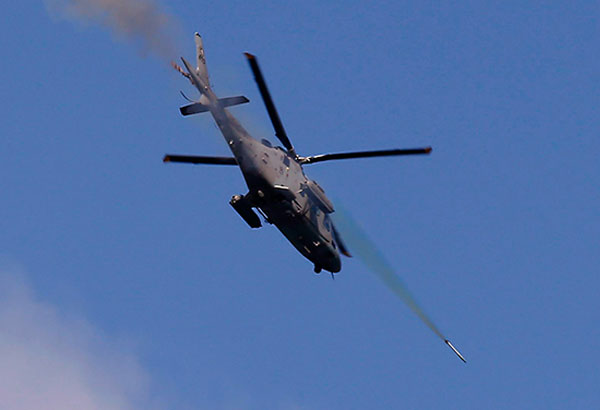JOLO, Philippines — President Duterte has vowed to ignore the Supreme Court and Congress as he enforces martial law across Mindanao despite the Constitution giving them oversight.
Duterte on Tuesday imposed martial law in Mindanao, home to 20 million people, following deadly clashes in the mostly Muslim-populated Marawi City involving the Maute group which, he said, was trying to establish a caliphate for the Islamic State group.
"Until the police and the Armed Forces say the Philippines is safe, this martial law will continue. I will not listen to others. The Supreme Court, Congress, they are not here," Duterte told soldiers on Saturday.
"Are they the ones dying and losing blood, bleeding, hemorrhaging because there is no help, no reinforcement? It's not they," he said.
The 1987 Constitution imposes limits on martial law to prevent a repeat of the abuses carried out under the regime of dictator Ferdinand Marcos, who was deposed by the people power revolution in 1986.
The Constitution requires Congress to approve a president's declaration of martial law, and limits military rule for 60 days. If a president wants to extend it, he or she must again get congressional endorsement.
The Supreme Court (SC) can also rule on martial law's legality.
"The Supreme Court will say they will examine into the factual (basis). Why I don't know. They are not soldiers. They do not know what is happening on the ground," Duterte said.
A day after declaring martial law, Duterte described the nine years of military rule under Marcos as "very good," and said his would be similar.
Duterte also told soldiers on Friday they would be allowed to conduct searches and arrests without warrants.
"During martial law, your commanders, you, you can arrest any person, search any house. There is no more warrant needed," Duterte told troops.
Duterte's comments contradicted a government statement released on Saturday to explain martial law.
"Warrants of arrest or search warrants should be issued," the statement from the government's information agency said.
"No person may be arrested and detained without orders coming from these civil courts."
Duterte has overwhelming support in Congress, which this week is widely expected to endorse his initial declaration of martial law.
Looming clash
Chief Justice Maria Lourdes Sereno, however, on Friday expressed concerns about martial law, saying the sins of martial law during the dictatorship of the late Ferdinand Marcos could possibly be repeated under the current martial law.
"Given the present day, when the possibility of history repeating itself looms imminent, no cause requires your commitment as much as the cause of human rights, justice, and democracy," Sereno was quoted as saying in her speech during the commencement exercise at the Ateneo de Manila University last Friday.
"Today, people's fundamental human rights and freedoms, the core of our democracy, face grave and blatant threats. The culture of impunity is on the rise. People are pressured to favor the easy choice over the right choice: expediency over due process; convenient labeling over fairness; the unlawful termination of human life over rehabilitation," she further stated.
But Justice Secretary Vitaliano Aguirre II yesterday questioned her opinion, stressing that statements publicly made by Sereno might be uncalled for.
"I believe such statements are premature and imprudent on the part of the Chief Justice," he told The STAR.
Aguirre said that Duterte's declaration of martial law to neutralize the Maute terror group after its occupation of Marawi City is expected to be submitted for judicial review of the SC through petition by critics.
The justice secretary said prudence dictates that members of the high court, including the chief justice, must refrain from commenting on legal questions and issues up for SC review, adding that public statements by magistrates could be used as ground for inhibition in cases.
Aguirre believes Sereno's position should better be included in a magistrate's written opinion on the issue only after submission of arguments, hearing and deliberations in the high tribunal.
The SC has yet to lay down guidelines on the use of executive power to declare martial law after the Marcos regime.
Still no implementing guidelines
One week into the declaration of martial law in Mindanao through Proclamation 216, no ground implementation guidelines have been issued by the Armed Forces of the Philippines (AFP) to the two major military commands in the area, the Eastern Mindanao Command (Eastmincom) and the Western Mindanao Command (Westmincom).
"(Eastmincom) is awaiting guidelines from the (AFP) on how this will be implemented on the ground," the Eastmincom said in a statement yesterday.
"We are yet to get a written guidance as to how the declaration will translate to our operations on the ground, especially here in Western Mindanao, where all threat groups are present," the Westmincom said in a separate statement.
"The guidelines will come out soon. They're working on them," Executive Secretary Salvador Medialdea told The STAR.
Eastmincom officials said they have remained on heightened alert since May 11, when joint AFP-Philippine National Police operations encountered the group of Isnilon Hapilon in Marawi City.
While noting volatile situation in its area, which jurisdiction includes Marawi City, Westmincom assured the public it would use the current mandate to boost its campaign against terrorism, in accordance with the law and with respect to human rights and the International Humanitarian Law.
'Misguided commentaries'
Meanwhile, Malacañang yesterday lashed at critics of the Mindanao martial law who feared it could lead to abuses and curtailment of civil and political rights.
Presidential spokesman Ernesto Abella dismissed the criticisms as "misguided commentaries."
"The President's focus is on addressing the terrorist threat in Mindanao," Abella said in a statement yesterday.
"He is committed to succeeding in this mission and to restoring peace and order so that other people throughout Mindanao can fully participate in our nation's development." — AFP, Edu Punay, Edith Rgalado, Alexis Romero


